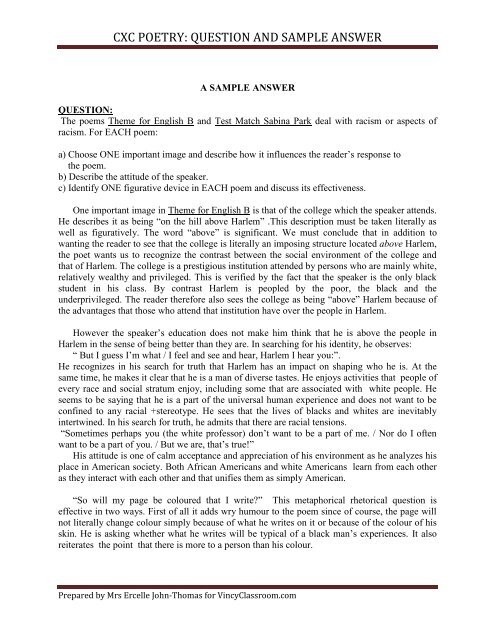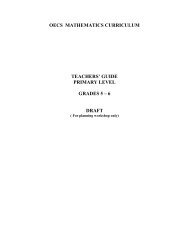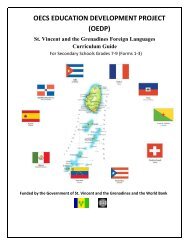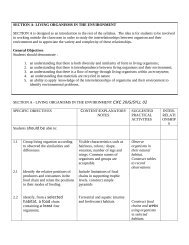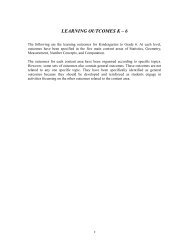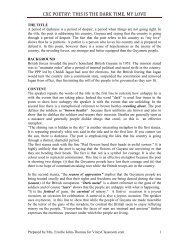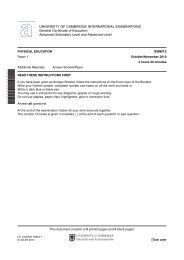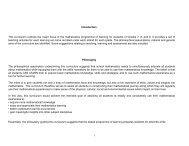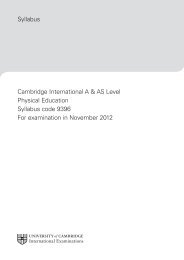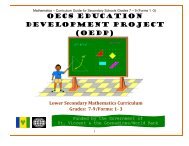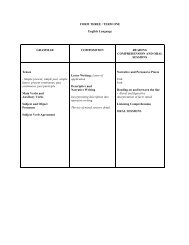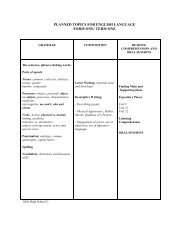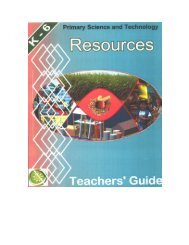CXC POETRY: QUESTION AND SAMPLE ANSWER - VincyClassroom
CXC POETRY: QUESTION AND SAMPLE ANSWER - VincyClassroom
CXC POETRY: QUESTION AND SAMPLE ANSWER - VincyClassroom
You also want an ePaper? Increase the reach of your titles
YUMPU automatically turns print PDFs into web optimized ePapers that Google loves.
<strong>CXC</strong> <strong>POETRY</strong>: <strong>QUESTION</strong> <strong>AND</strong> <strong>SAMPLE</strong> <strong>ANSWER</strong><br />
A <strong>SAMPLE</strong> <strong>ANSWER</strong><br />
<strong>QUESTION</strong>:<br />
The poems Theme for English B and Test Match Sabina Park deal with racism or aspects of<br />
racism. For EACH poem:<br />
a) Choose ONE important image and describe how it influences the reader’s response to<br />
the poem.<br />
b) Describe the attitude of the speaker.<br />
c) Identify ONE figurative device in EACH poem and discuss its effectiveness.<br />
One important image in Theme for English B is that of the college which the speaker attends.<br />
He describes it as being “on the hill above Harlem” .This description must be taken literally as<br />
well as figuratively. The word “above” is significant. We must conclude that in addition to<br />
wanting the reader to see that the college is literally an imposing structure located above Harlem,<br />
the poet wants us to recognize the contrast between the social environment of the college and<br />
that of Harlem. The college is a prestigious institution attended by persons who are mainly white,<br />
relatively wealthy and privileged. This is verified by the fact that the speaker is the only black<br />
student in his class. By contrast Harlem is peopled by the poor, the black and the<br />
underprivileged. The reader therefore also sees the college as being “above” Harlem because of<br />
the advantages that those who attend that institution have over the people in Harlem.<br />
However the speaker’s education does not make him think that he is above the people in<br />
Harlem in the sense of being better than they are. In searching for his identity, he observes:<br />
“ But I guess I’m what / I feel and see and hear, Harlem I hear you:”.<br />
He recognizes in his search for truth that Harlem has an impact on shaping who he is. At the<br />
same time, he makes it clear that he is a man of diverse tastes. He enjoys activities that people of<br />
every race and social stratum enjoy, including some that are associated with white people. He<br />
seems to be saying that he is a part of the universal human experience and does not want to be<br />
confined to any racial +stereotype. He sees that the lives of blacks and whites are inevitably<br />
intertwined. In his search for truth, he admits that there are racial tensions.<br />
“Sometimes perhaps you (the white professor) don’t want to be a part of me. / Nor do I often<br />
want to be a part of you. / But we are, that’s true!”<br />
His attitude is one of calm acceptance and appreciation of his environment as he analyzes his<br />
place in American society. Both African Americans and white Americans learn from each other<br />
as they interact with each other and that unifies them as simply American.<br />
“So will my page be coloured that I write?” This metaphorical rhetorical question is<br />
effective in two ways. First of all it adds wry humour to the poem since of course, the page will<br />
not literally change colour simply because of what he writes on it or because of the colour of his<br />
skin. He is asking whether what he writes will be typical of a black man’s experiences. It also<br />
reiterates the point that there is more to a person than his colour.<br />
Prepared by Mrs Ercelle John-Thomas for <strong>VincyClassroom</strong>.com
<strong>CXC</strong> <strong>POETRY</strong>: <strong>QUESTION</strong> <strong>AND</strong> <strong>SAMPLE</strong> <strong>ANSWER</strong><br />
Test Match Sabina Park starts with an image of an English man attending a cricket match in<br />
Jamaica. The image is contained in the metaphor “Proudly wearing the rosette of my skin”.<br />
Unlike the persona in Theme for English B this man’s self importance is based solely on his<br />
colour. A rosette is worn to show support for a particular team and is in that team’s colour. The<br />
English man enters the cricket ground, proud that his skin colour sets him apart from most of the<br />
spectators who are black Jamaicans. He does not need an actual rosette to show where his<br />
support lies. His skin colour says it all. As a result of this image, the reader responds to the poem<br />
by seeing the man as shallow and disliking him for his arrogance. Later on when he is so<br />
embarrassed by the poor performance of the English team and by the contempt and ridicule of<br />
the local crowd, the reader recognizes the irony of the situation and feels that justice has been<br />
served.<br />
At first, the speaker’s arrogance is overbearing. His contempt is based on the fact that things<br />
are different from what obtains in England. He criticizes the crowd for being “caged vociferous<br />
partisans” and even expresses disapproval at the fact that there is a crowd. The words “caged”<br />
and “partisans” show that he thinks that their appreciation of the game is limited to what their<br />
own side does as they can find nothing to applaud in the batting of the English team. However as<br />
the crowd responds with their own contempt “praps dem should-a-borrow Lawrence Rowe”, he<br />
tries to make excuses for the English team’s lacklustre game, but does not even sound<br />
convincing to himself. His self assurance is diminished and the pride in being white with which<br />
he strutted into Sabina Park leaves him. He begins to see himself as the crowd sees him and he<br />
is ashamed of what he sees. Even his language changes as a result of his encounter with the<br />
crowd. Instead of using the English word “abuse”, he confesses to being so troubled by the<br />
crowd’s “busing” (the Jamaican vernacular) that he “skulks” out of the park.<br />
One figurative device used in the poem is the pun in the first stanza which reads:<br />
“England boycotting excitement bravely, / something badly amiss.”<br />
The poet cleverly plays with the surnames of two members of the English team, Boycott and<br />
Amiss to show that something is wrong (amiss) and to pretend that the boring nature of the<br />
game can only be a (boycott), a deliberate act of sabotage. He humorously implies that such bad<br />
playing cannot be accidental. The pun is effective because it introduces a comic effect into the<br />
poem and helps us to imagine just how badly the English men played.<br />
Prepared by Mrs Ercelle John-Thomas for <strong>VincyClassroom</strong>.com


